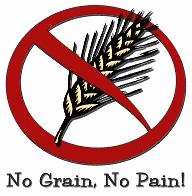
What you don’t know about gluten might be causing you to suffer unnecessarily from fatigue, muscle and joint pain, headaches, arthritis, thyroid disease, depression, brain fog, memory impairment, skin problems, and more! Read on to separate myth from fact and save your health.
1. Gluten-free is just a marketing trend/fad diet/way for picky eaters to turn down cake at parties.
The number of people eating a gluten-free diet is growing as awareness about the dangers of gluten continues to rise. Gluten-free is by no means a fad that is going to go away. Many of the chronic health problems that people seek prescription drugs for can actually be avoided by eating a gluten-free diet.
2. Gluten sensitivities and celiac disease are problems that people develop as children.
Gluten sensitivities and celiac disease can occur at any time of your life. You may develop a sensitivity to gluten as an adult even though you had no problem with gluten as a child. No one really knows for sure what causes the onset of celiac disease, though some suspect that exposure to genetically modified foods may permanently alter your body and start a cascade of autoimmune processes.
3. Sensitivities to gluten are allergic reactions.
Gluten sensitivity and celiac disease is not a food allergy. Allergies cause immediate reactions that may include hives, sneezing, itching, or even anaphylaxis. Common allergens include pollen, mold, cat dander, peanuts, chocolate, and shellfish. In contrast, gluten sensitivity and celiac disease is an autoimmune disorder in which the body attacks itself every time it is exposed to gluten. You may not notice an immediate reaction after eating a piece of wheat bread, for instance, but one week later you may develop a headache or swollen joints. In If your body attacks its own intestinal villi, you can develop a malabsorption problem that could cause you to suffer from B12 deficiency, anemia, or other vitamin/mineral/macronutrient deficiencies. Some people notice mucus in their stool as a result of eating gluten, but pass this off as meaning they need to stop eating meat or do a colon cleanse or liquid diet to get rid of the mucus. In actuality, they just need to stop eating gluten.
4. If a food is wheat-free, it doesn’t contain gluten.
Gluten is present in a variety of grains, including wheat, barley, rye, kamut, spelt, triticale, and malt. It may also contaminate some oats, rice, corn, soy, beans, nuts, or any other foods that were processed in a facility that also processes gluten-containing grains. Any prepared foods that are rolled in flour or contain gravies or sauces containing flour also contain gluten. Some vegetarian “faux meats” such as seitan and Quorn use gluten as a source of protein. Always read the labels of any processed foods before purchasing them to make sure questionable ingredients have not been added.
5. Eating a gluten-free diet is too expensive.
There are many gluten-free breads, pancake mixes, cake mixes, cookies, desserts, and other “treats” made from rice flour, soy flour, potato starch, tapioca starch, cassava, and other gluten-free starches available in stores nowadays. These products can be highly overpriced! I don’t generally recommend these products because they are typically highly processed items with very low nutritional value, and tend to be loaded with high-glycemic carbohydrates that can send your blood sugar soaring — then then crashing down two hours later — making you crave more. If you feel that you absolutely have to eat bread, cookies, cakes, and other treats, you can easily make your own with coconut flour, almond flour, nut/seed mixtures, and even vegetables & fruits that you can process into “flours” using a food processor and a food dehydrator. There are plenty of free recipes for “grainless raw bread,” for instance, that you can find on the internet. With a little creativity, you can make everything from pancakes to pasta without having to resort to grains or overpriced commercial foods ever again.
6. Only a small number of people suffer from celiac disease.
While the “official” estimate is that about 1 out of every 100 people has celiac disease (autoimmune disease diagnosable by identifying damage to the intestinal villi through endoscopic examination), this does not include those who merely have a gluten sensitivity (autoimmune reaction to gluten that doesn’t include damage to the intestinal villi). And because both celiac disease and gluten sensitivit y are often misdiagnosed as fibromyalgia, rheumatoid arthritis, Alzheimer’s, depression, eczema, hypothyroidism, or any other illness that occurs as a result of the gluten intolerance, many sufferers don’t know they have it. If they would just stop eating foods containing gluten, the health imbalances caused by eating gluten will typically go away within six months to a year of consuming a 100% gluten-free diet.
7. When gluten causes a health problem, it is a digestive problem.
Gluten sensitivity may give rise to over 300 different symptoms! While constipation, irritable bowel syndrome, mucus seen in bowel movements, diarrhea, heartburn, GERD, and other gastrointestinal symptoms may occur as a result of gluten intolerance, many sufferers may not have any digestive symptoms at all. Chronic pain, diabetes, weight gain, mental and psychological problems, and even cancer can result from eating gluten.
8. A gluten-free diet causes weight loss.
While celiac disease and gluten sensitivity can disrupt thyroid function, make you too tired/sore to exercise, cause blood sugar fluctuations, and other conditions that may lead to weight gain and difficulty losing weight, going gluten-free is not just another fad diet for weight loss. As you begin to experience more energy and vitality on a gluten-free diet, you may be able to shed unwanted pounds that you had previously been unable to get rid of. However, if you are already at your ideal weight and body composition, you can still maintain your weight on a gluten-free diet if you simply eat enough food! Since you won’t be getting your calories from wheat bread, breakfast cereal, pancakes from IHOP, and hamburger buns, you’ll need to get your calories from other foods such as nuts/seeds, coconut, vegetables, butter, cream, fish, meat, fruit, and other delicious, nutrient-rich, wholesome foods.
9. If you’re gluten-sensitive, just one bite of birthday cake or fresh-baked sprouted grain bread won’t hurt.
Eating just one bite or one small treat is not a “cheat.” It’s self-mutilation. If you react to gluten, there is no such thing as a safe level of gluten exposure. Even if you made your own wheat flour from soaked, sprouted grains, and baked your own bread or cake with LOVE, that one bite of gluten can set you back 6 months in your healing process. Giving gluten up entirely is the only safe course of action.
A 100% gluten-free, grain-free diet saved my life and has worked for me for over 8 years. Therefore, I take the word “gluten-free” very seriously and don’t see it as a marketing term or passing fad. I make sure that ALL products in the Holistic Chinese Herbs Store are gluten-free and from reputable companies with stringent quality control measures to make sure what’s on the label is actually what you’re getting in the product. This includes facial and body care products, too, because I believe that what you put on your skin can and is absorbed by the body just like anything you eat or drink.

